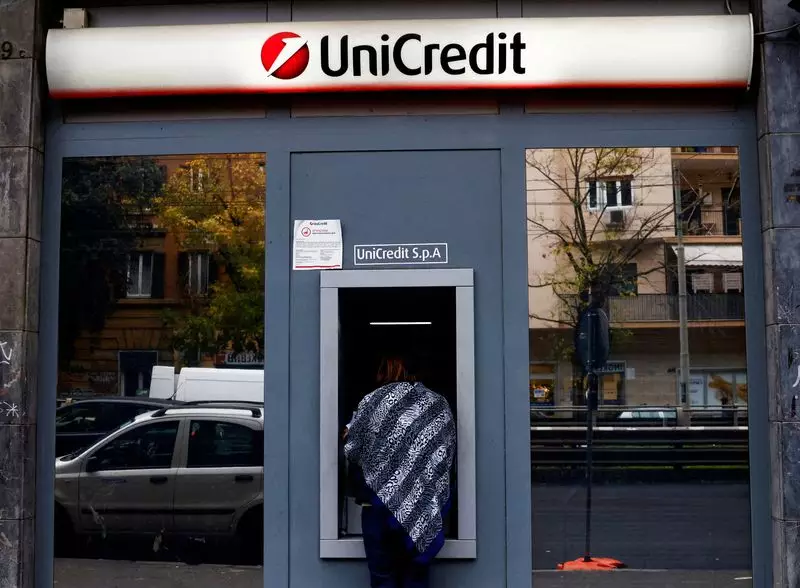In recent months, the European banking sector has found itself amidst heightened tension, particularly spotlighted by the ongoing developments involving UniCredit and Commerzbank. The relationship between these two banking giants has escalated into a complex drama, involving national interests, regulatory scrutiny, and strategic positioning. Germany’s stern rebuke to UniCredit’s latest stake increase underscores the broader ramifications that arise when foreign banks seek significant influence over national banking institutions.
Germany’s decision to reject UniCredit’s effort to increase its stake in Commerzbank to 28% is rooted in a desire to maintain stability and control within its banking system. The phrase “uncoordinated and unfriendly approach” used by a German government spokesperson encapsulates the sentiment prevailing in Berlin. The concern is not merely about the increase in shareholding but rather the potential implications of having a foreign entity exert significant influence over a key national lender, especially during a sensitive political period ahead of federal elections.
Despite UniCredit CEO Andrea Orcel’s insistence that he intended to bide his time until a new government emerged, the Italian bank’s aggressive move appears contradictory to this stated approach. The underlying fear within Germany is that a dominant UniCredit presence could compromise the integrity of Commerzbank’s management and strategic direction, particularly at a time when the German government is seeking to assert its influence over its own financial institutions.
UniCredit’s strategy employs the use of derivatives to bypass initial regulatory thresholds that would normally require a formal takeover offer, showcasing a sophisticated understanding of financial instruments. By holding 9.5% directly and an additional 18.5% through these derivatives, UniCredit positions itself favorably to influence Commerzbank’s future. This move reflects a calculated approach to gain leverage while maintaining a facade of regulatory compliance.
Marco Troiano, a financial analyst, emphasized that by securing a larger stake in Commerzbank, UniCredit is gearing up to assert more control over the bank’s operations. This maneuver not only applies pressure on Commerzbank’s management but also threatens to constrain the strategic options available to the German bank. Such implications highlight the delicate balance between investment ambition and the reservations harbored by national governments regarding foreign ownership of critical economic assets.
The current standoff highlights a significant trend within the European banking sector, where cross-border investments are increasingly contentious. The European Central Bank’s (ECB) regulatory role is pivotal, as it reviews UniCredit’s stake to ensure compliance with European financial regulations. As the ECB’s evaluation process unfolds, it draws attention to the cautious nature with which European regulators approach foreign investments in domestic banks.
Scholars and market analysts argue that such scrutiny may be necessary to protect domestic interests. However, it could also stifle opportunities for cooperation and growth within the broader EU banking framework, an environment that is already under pressure from economic volatility and geopolitical tensions. While UniCredit views its moves as creating value and potential consolidation within the industry, the German response serves as a stark reminder of the complexities and sensitivities involved in such high-stakes financial plays.
As Germany reinvigorates its efforts to maintain sovereign control over its banking systems, the potential outcomes of this situation remain uncertain. UniCredit’s position could either lead to a dramatic shift in European banking dynamics or serve as a cautionary tale against expansive foreign investments. For now, the market reaction appears somewhat positive, with shares in Commerzbank experiencing an uptick even amid the turbulence.
Going forward, both UniCredit and Commerzbank will need to navigate the intricacies of this evolving situation. For UniCredit, the focus is not solely on Commerzbank but also its aspirations with Banco BPM, adding another layer of strategic complexity to its European endeavors. On the other hand, as Commerzbank prepares to present its strategy to investors, it must balance stakeholder interests, governmental oversight, and the shadow of potential foreign influence.
The unfolding scenarios between UniCredit and Commerzbank will remain a focal point in the European financial sector, shaping conversations about national autonomy, regulatory frameworks, and the future of cross-border banking relationships in an increasingly integrated yet divided market landscape.

